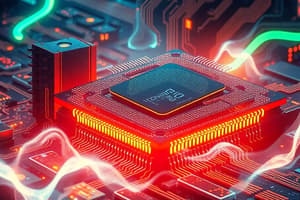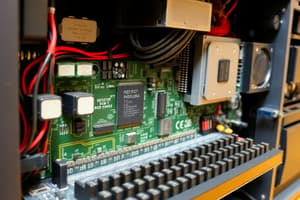Podcast
Questions and Answers
What does the term 'computer' originate from?
What does the term 'computer' originate from?
- The Latin 'calculare', meaning 'to count'
- The Greek 'technologia', meaning 'to craft'
- The English 'compute', meaning 'to process'
- The Latin 'computare', meaning 'to calculate' (correct)
What is the primary function of the CPU?
What is the primary function of the CPU?
- Executing instructions and performing calculations (correct)
- Managing hardware and providing a platform
- Permanently storing data, programs, and operating system
- Temporary storage of data and applications
What type of computer is designed for mobility?
What type of computer is designed for mobility?
- Laptop Computers (correct)
- Servers
- Desktop Computers
- Tablets
What is the primary function of the Operating System?
What is the primary function of the Operating System?
What type of computer is used for complex calculations and simulations?
What type of computer is used for complex calculations and simulations?
What is the primary function of Data Processing?
What is the primary function of Data Processing?
Flashcards are hidden until you start studying
Study Notes
Definition and History
- A computer is an electronic device that takes in information, processes it, stores it, and produces a desired output.
- The term "computer" comes from the Latin "computare," meaning "to calculate."
- The first electronic computer was developed in the 1940s, with the first commercial computer, UNIVAC I, released in 1951.
Components
- Hardware:
- CPU (Central Processing Unit): executes instructions and performs calculations.
- Memory (RAM): temporary storage for data and applications.
- Storage Drive: permanent storage for data, programs, and operating system.
- Input/Output Devices: keyboard, mouse, monitor, etc.
- Software:
- Operating System (OS): manages hardware and provides a platform for running applications.
- Applications: programs that perform specific tasks, such as word processing or web browsing.
Types of Computers
- Desktop Computers: designed for individual use, often stationary.
- Laptop Computers: portable, designed for mobility.
- Tablets: touchscreen devices, often used for media consumption.
- Servers: powerful computers that manage and provide access to resources over a network.
- Supercomputers: extremely powerful computers for complex calculations and simulations.
- Embedded Systems: specialized computers integrated into devices, such as appliances or vehicles.
Functions and Uses
- Data Processing: performs calculations, executes instructions, and manages data.
- Communication: enables communication over networks, such as the internet.
- Automation: automates tasks, increases efficiency, and improves productivity.
- Entertainment: provides a platform for games, multimedia, and other leisure activities.
- Education: facilitates learning, research, and collaboration.
Studying That Suits You
Use AI to generate personalized quizzes and flashcards to suit your learning preferences.



